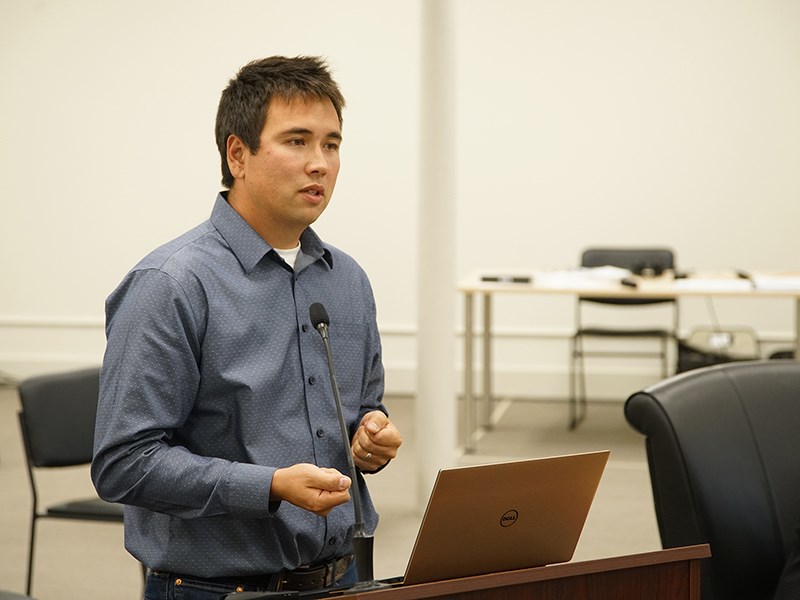City of Powell River councillors will be considering an adjustment to the penalty period for municipal taxes not collected by the July 2 deadline.
At the May 4 committee of the whole meeting, chief financial officer Adam Langenmaier introduced a report calling for a tax deadline that provides a less punitive penalty for unpaid taxes. Under the regular regime, unpaid taxes after July 2 would be subject to a 10 per cent penalty. Langenmaier’s report called for council to consider a five per cent penalty on July 3 and a further five per cent penalty on October 16 for any unpaid property taxes.
In 2020, with the onset of COVID-19, council extended the penalty-free deadline to September 30, where a five per cent penalty would be imposed on unpaid taxes, and a December 4 deadline, where unpaid taxes would result in another five per cent penalty.
Langenmaier said for this year, he is proposing a more lenient penalty structure than the city has seen historically. He said this year, he is proposing a five per cent penalty after July 2 and another five per cent penalty on unpaid taxes after October 15.
“To set a penalty, we must prepare a bylaw and it would be nice to have this bylaw considered as soon as possible so we can start printing our property tax notices,” said Langenmaier.
Committee chair councillor George Doubt said he thought it was a reasonable accommodation.
Mayor Dave Formosa said Langenmaier is recommending not to give any extension without penalty, just a lighter penalty. Langenmaier said that is correct.
Formosa said he thought the city may be offering, because COVID-19 hasn’t gone away, an extension. He said people and businesses are still suffering from the effects of the pandemic. He said he had at least three businesses that were suffering from COVID-19.
“I think people have lost work over it and are still not back to work,” said Formosa. “I don’t think we’re out of the woods. I would propose maybe we would give a bit of a break.”
Councillor Cindy Elliott said her thoughts were similar to Formosa’s.
“I think our model from last year would still apply this year due to the COVID-19 situation,” said Elliott. “Powell River in general has a lot more summertime employment than winter. If people have been suffering and lacking from work it’s possible that some flexibility over the summer would be very helpful. I know that’s the case for a lot of businesses as well. I would be in favour of a model that looks a little more like last year.”
Councillor Rob Southcott said Langenmaier’s proposal initially seemed reasonable to him. He asked if he missed in the report a rationale for going halfway back to business as usual.
“How did you pick that half way?” asked Southcott.
Langenmaier said he chose the proposed penalty structure by hearing from other municipalities and what those municipalities’ approaches were.
“There’s the understanding that we are still not out of the woods but also trying to return to some normality, while having some lenience,” said Langenmaier.
Councillor Jim Palm said last year there were fewer penalties handed out. He asked if there were any adverse effects to the city’s coffers as a result.
Unpaid taxes affect cash flow
Langenmaier said the impact of removing the penalty on July 2, there was less certainty about when property taxes would be paid. He said there was a cash flow issue where the city was running low on unallocated funds to continue operations. He said between now and July is when the city is leanest on cash and at times the city has to dip into reserves in the short term to bridge the operating cash needs.
“Once the taxes come in, we are flush with cash again, we pay our reserves and continue as normal,” said Langenmaier.
Doubt said he was wondering if the dates could be changed and if it could be a five per cent penalty around September 1 and another five per cent in mid-December.
Langenmaier said with direction from the committee, the bylaw could be updated for council’s consideration on May 6.
He said the city is in good financial position, cash-wise and reserve-wise, so the city would not run into a situation where it would have to use interim short-term borrowing to maintain operations. He said there could be delay of a few capital projects.
“Truthfully, there wouldn’t be a huge detrimental impact, however, depending on how far we go, we could be into further issues,” said Langenmaier.
Councillors gave unanimous consent to take the matter to the May 6 council meeting for further discussion.



